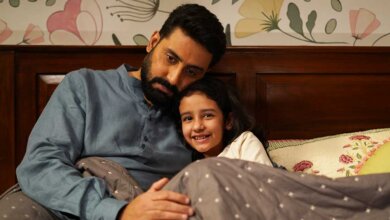Khauf

Khauf Review
The Real Horror Is Not the Ghost, It’s the World Women Live In
We’ve often heard the phrase “Darr ke aage jeet hai,” but Khauf takes a haunting detour—suggesting, perhaps, “Darr ke peeche mard hai.” This Prime Video series dives headfirst into the silent, constant fear that many women live with—not just from ghosts or spirits, but from everyday threats that feel even more terrifying.
The Premise: More Than Just a Haunted Hostel
Khauf opens with a disturbing, all-too-relatable scene: a woman walking alone at night in Delhi, constantly glancing over her shoulder. You feel every heartbeat, every footstep, every ounce of dread. This sets the tone for the series, which is anchored in the eerie setting of the Pragati Working Women’s Hostel, a building on the edge of the city that holds not just secrets—but trauma.
A tragedy involving a young woman named Annu has left a lingering shadow over the hostel. Her close friends—Rima, Swetlana, Nikki, and Komal—remain trapped within the premises, convinced that something supernatural won’t let them leave. When Madhuri, a gangrape survivor from Gwalior played by Monika Panwar, arrives and takes the locked room Annu once lived in, she unknowingly steps into a cycle of fear and unresolved pain.
The Real Fear? Being a Woman in This World
Yes, Khauf offers paranormal scares, but the greater terror lies in its mirror to reality—the male gaze, the everyday trauma, the fight for safety and survival. Madhuri’s struggle isn’t just with a ghost; it’s with memories, men, and a system that repeatedly fails women. The scariest part? The ghost often seems kinder than the real world.
Strong Writing & Direction That Grips You
Creators Smita Singh, Pankaj Kumar, and Surya Balakrishnan masterfully blend social commentary with horror. The story doesn’t rely on jump scares alone—it’s layered, intense, and thoughtful. Each episode peels back layers of pain, forcing viewers to question what’s truly horrifying—the supernatural or the normalized?
The characters are deeply etched. Geetanjali Kulkarni as a determined police constable, Rajat Kapoor as a sinister half-human tantrik, and Shalini Vatsa as the strict but understanding hostel warden—each brings gravitas and depth to the narrative. And then there’s Nakul, the “nice guy” whose kindness feels suspicious. Khauf even makes you fear the good ones—because women are conditioned to.
Standout Performances & Storytelling
Monika Panwar is absolutely compelling as Madhuri. Her journey is harrowing but powerful—she’s not painted as a victim, but as a survivor. The ensemble cast adds weight to the narrative, and the tight script ensures there’s never a dull moment.
Shalini Vatsa’s warden is particularly memorable. She’s seen it all, and though she’s not overtly affectionate, her empathy is unmistakable. She’s not just managing a hostel—she’s guarding a battlefield of broken souls.
What Misses the Mark
While most of the series is brilliant, one character—Arun—stands out for the wrong reasons. He’s portrayed as a man who loves Madhuri but embodies the worst kind of entitlement. He makes her trauma about himself, reinforces sexist tropes, and yet the screenplay lets him off the hook a bit too easily. This subtle normalizing of toxic male behavior feels jarring in an otherwise razor-sharp script.
Final Thoughts:
A Gripping Watch That Stays With You
Khauf doesn’t offer hope in bright colors. It shows that sometimes, the only way out is through. The women here aren’t damsels waiting to be rescued—they’re fighters, even if the fight is exhausting.
The ghosts of this story are metaphors—reminders of abuse, trauma, societal rot, and unending fear. And while there are moments of survival and strength, the series never sugarcoats reality. There’s no silver lining—just shades of grey that women have to live with, every single day.
Rating: ⭐⭐⭐⭐ (4/5)
Unflinching, unsettling, and unforgettable. Khauf is a must-watch.








